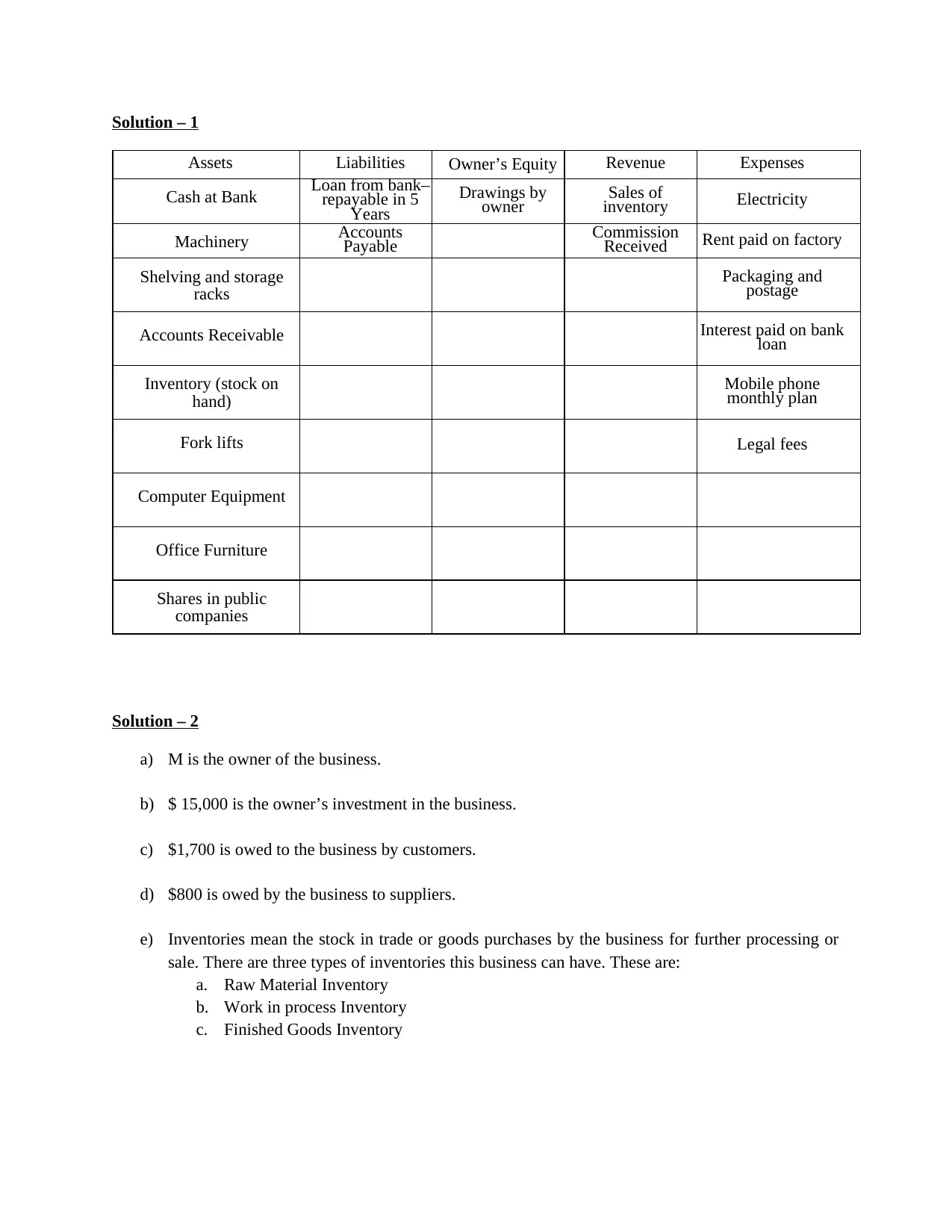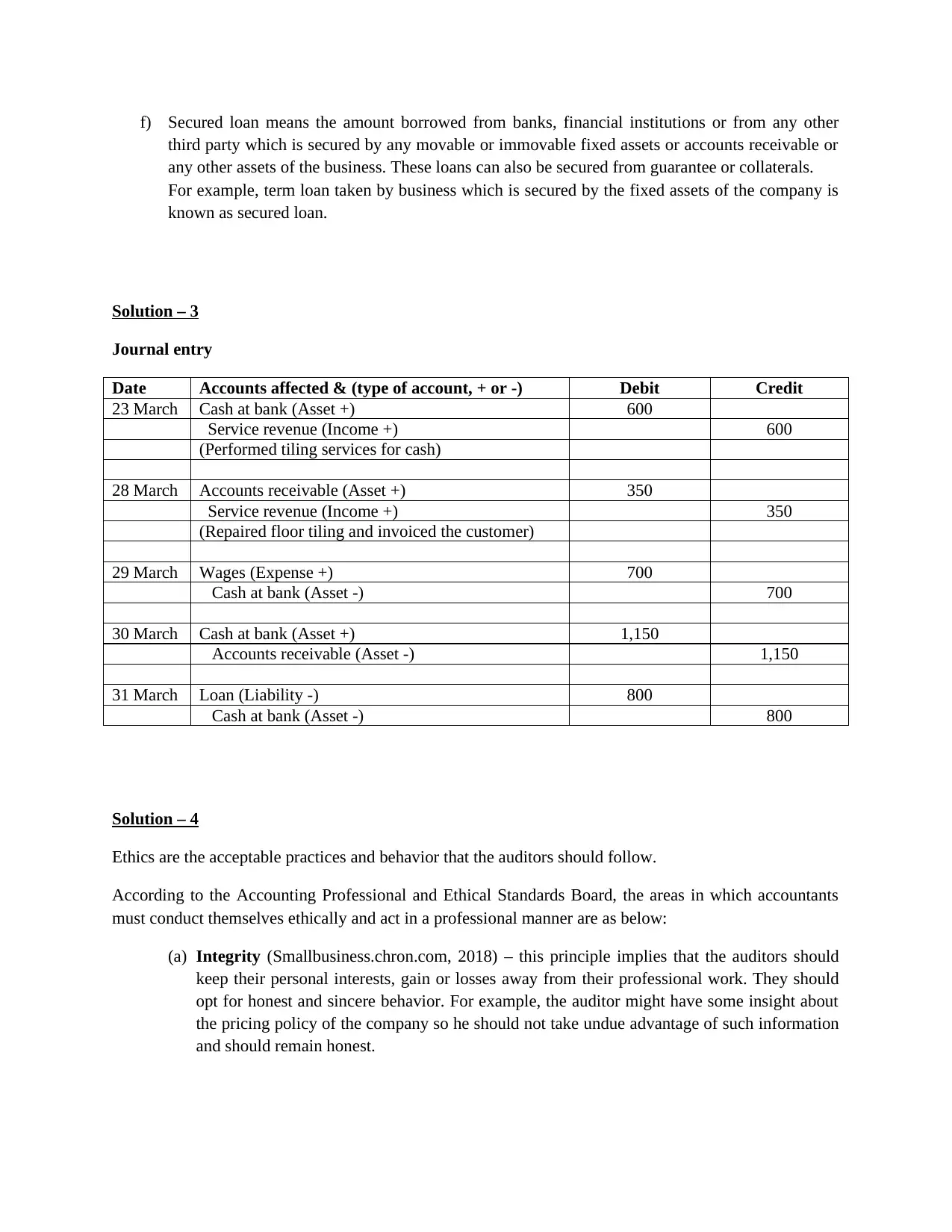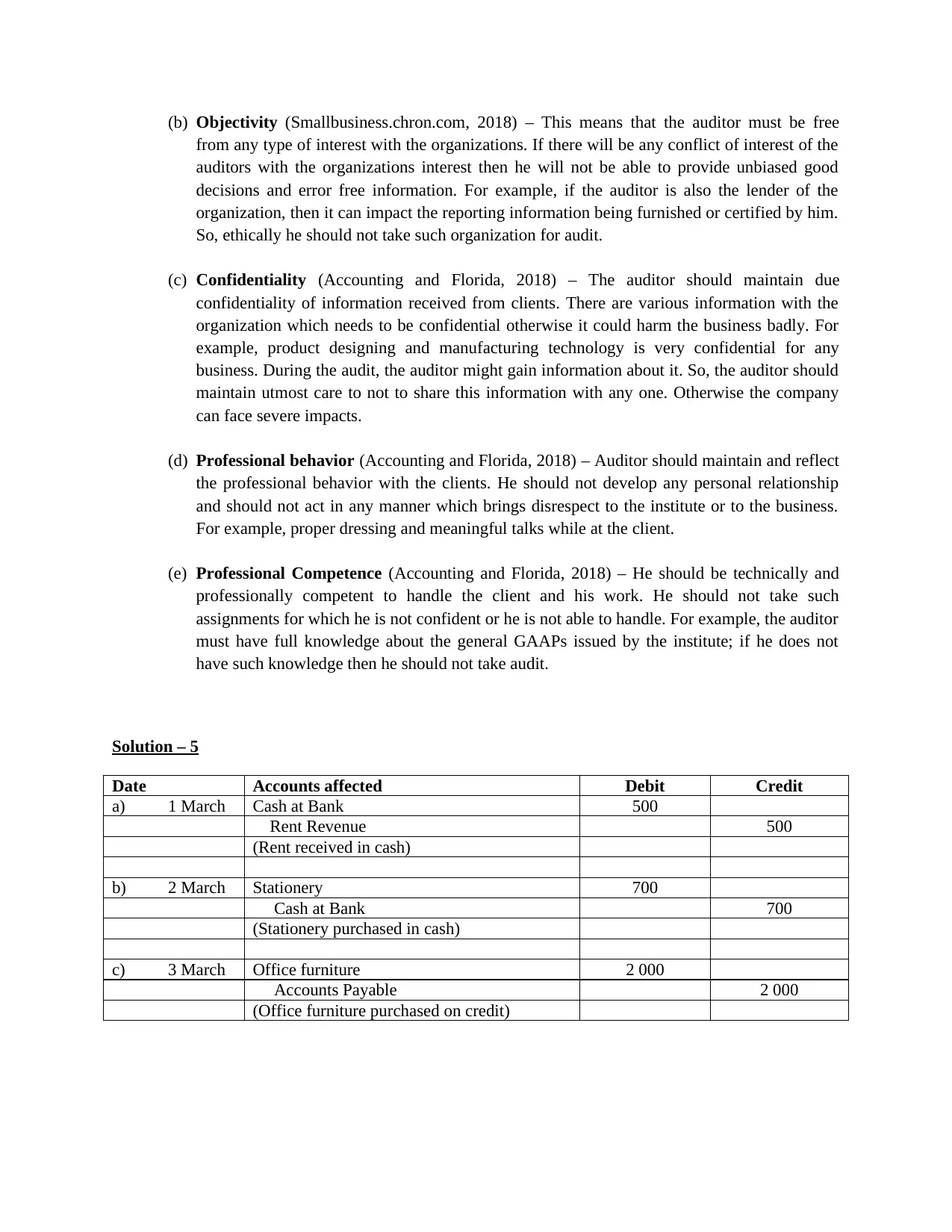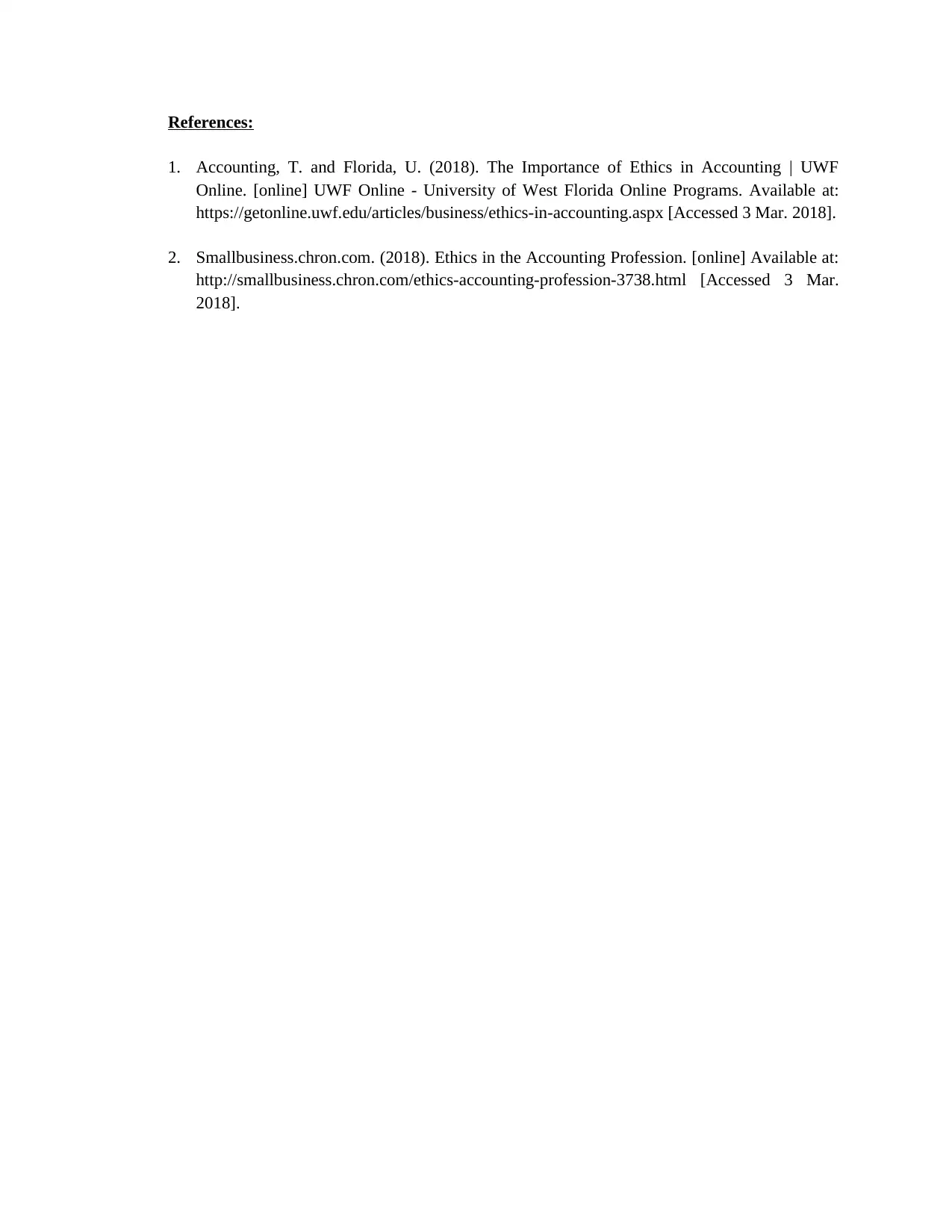Financial Accounting Homework: Solutions and Ethics Overview
VerifiedAdded on 2021/04/19
|4
|922
|57
Homework Assignment
AI Summary
This document provides solutions to a financial accounting assignment. It begins with a breakdown of financial statement elements, including assets, liabilities, owner's equity, revenue, and expenses, along with examples of each. The assignment then presents a scenario involving a business owner's investment, accounts receivable, and payable, and inventory types. The solution includes journal entries for various transactions, such as service revenue, wage payments, and loan adjustments. The document also addresses accounting ethics, outlining key principles like integrity, objectivity, confidentiality, professional behavior, and competence. Finally, it provides journal entries for transactions involving rent revenue, stationery purchases, and office furniture acquired on credit. This resource from Desklib offers students comprehensive accounting solutions.

Solution – 1
Assets Liabilities Owner’s Equity Revenue Expenses
Cash at Bank Loan from bank–
repayable in 5
Years
Drawings by
owner Sales of
inventory Electricity
Machinery Accounts
Payable Commission
Received Rent paid on factory
Shelving and storage
racks
Packaging and
postage
Accounts Receivable Interest paid on bank
loan
Inventory (stock on
hand)
Mobile phone
monthly plan
Fork lifts Legal fees
Computer Equipment
Office Furniture
Shares in public
companies
Solution – 2
a) M is the owner of the business.
b) $ 15,000 is the owner’s investment in the business.
c) $1,700 is owed to the business by customers.
d) $800 is owed by the business to suppliers.
e) Inventories mean the stock in trade or goods purchases by the business for further processing or
sale. There are three types of inventories this business can have. These are:
a. Raw Material Inventory
b. Work in process Inventory
c. Finished Goods Inventory
Assets Liabilities Owner’s Equity Revenue Expenses
Cash at Bank Loan from bank–
repayable in 5
Years
Drawings by
owner Sales of
inventory Electricity
Machinery Accounts
Payable Commission
Received Rent paid on factory
Shelving and storage
racks
Packaging and
postage
Accounts Receivable Interest paid on bank
loan
Inventory (stock on
hand)
Mobile phone
monthly plan
Fork lifts Legal fees
Computer Equipment
Office Furniture
Shares in public
companies
Solution – 2
a) M is the owner of the business.
b) $ 15,000 is the owner’s investment in the business.
c) $1,700 is owed to the business by customers.
d) $800 is owed by the business to suppliers.
e) Inventories mean the stock in trade or goods purchases by the business for further processing or
sale. There are three types of inventories this business can have. These are:
a. Raw Material Inventory
b. Work in process Inventory
c. Finished Goods Inventory
Paraphrase This Document
Need a fresh take? Get an instant paraphrase of this document with our AI Paraphraser

f) Secured loan means the amount borrowed from banks, financial institutions or from any other
third party which is secured by any movable or immovable fixed assets or accounts receivable or
any other assets of the business. These loans can also be secured from guarantee or collaterals.
For example, term loan taken by business which is secured by the fixed assets of the company is
known as secured loan.
Solution – 3
Journal entry
Date Accounts affected & (type of account, + or -) Debit Credit
23 March Cash at bank (Asset +) 600
Service revenue (Income +) 600
(Performed tiling services for cash)
28 March Accounts receivable (Asset +) 350
Service revenue (Income +) 350
(Repaired floor tiling and invoiced the customer)
29 March Wages (Expense +) 700
Cash at bank (Asset -) 700
30 March Cash at bank (Asset +) 1,150
Accounts receivable (Asset -) 1,150
31 March Loan (Liability -) 800
Cash at bank (Asset -) 800
Solution – 4
Ethics are the acceptable practices and behavior that the auditors should follow.
According to the Accounting Professional and Ethical Standards Board, the areas in which accountants
must conduct themselves ethically and act in a professional manner are as below:
(a) Integrity (Smallbusiness.chron.com, 2018) – this principle implies that the auditors should
keep their personal interests, gain or losses away from their professional work. They should
opt for honest and sincere behavior. For example, the auditor might have some insight about
the pricing policy of the company so he should not take undue advantage of such information
and should remain honest.
third party which is secured by any movable or immovable fixed assets or accounts receivable or
any other assets of the business. These loans can also be secured from guarantee or collaterals.
For example, term loan taken by business which is secured by the fixed assets of the company is
known as secured loan.
Solution – 3
Journal entry
Date Accounts affected & (type of account, + or -) Debit Credit
23 March Cash at bank (Asset +) 600
Service revenue (Income +) 600
(Performed tiling services for cash)
28 March Accounts receivable (Asset +) 350
Service revenue (Income +) 350
(Repaired floor tiling and invoiced the customer)
29 March Wages (Expense +) 700
Cash at bank (Asset -) 700
30 March Cash at bank (Asset +) 1,150
Accounts receivable (Asset -) 1,150
31 March Loan (Liability -) 800
Cash at bank (Asset -) 800
Solution – 4
Ethics are the acceptable practices and behavior that the auditors should follow.
According to the Accounting Professional and Ethical Standards Board, the areas in which accountants
must conduct themselves ethically and act in a professional manner are as below:
(a) Integrity (Smallbusiness.chron.com, 2018) – this principle implies that the auditors should
keep their personal interests, gain or losses away from their professional work. They should
opt for honest and sincere behavior. For example, the auditor might have some insight about
the pricing policy of the company so he should not take undue advantage of such information
and should remain honest.

(b) Objectivity (Smallbusiness.chron.com, 2018) – This means that the auditor must be free
from any type of interest with the organizations. If there will be any conflict of interest of the
auditors with the organizations interest then he will not be able to provide unbiased good
decisions and error free information. For example, if the auditor is also the lender of the
organization, then it can impact the reporting information being furnished or certified by him.
So, ethically he should not take such organization for audit.
(c) Confidentiality (Accounting and Florida, 2018) – The auditor should maintain due
confidentiality of information received from clients. There are various information with the
organization which needs to be confidential otherwise it could harm the business badly. For
example, product designing and manufacturing technology is very confidential for any
business. During the audit, the auditor might gain information about it. So, the auditor should
maintain utmost care to not to share this information with any one. Otherwise the company
can face severe impacts.
(d) Professional behavior (Accounting and Florida, 2018) – Auditor should maintain and reflect
the professional behavior with the clients. He should not develop any personal relationship
and should not act in any manner which brings disrespect to the institute or to the business.
For example, proper dressing and meaningful talks while at the client.
(e) Professional Competence (Accounting and Florida, 2018) – He should be technically and
professionally competent to handle the client and his work. He should not take such
assignments for which he is not confident or he is not able to handle. For example, the auditor
must have full knowledge about the general GAAPs issued by the institute; if he does not
have such knowledge then he should not take audit.
Solution – 5
Date Accounts affected Debit Credit
a) 1 March Cash at Bank 500
Rent Revenue 500
(Rent received in cash)
b) 2 March Stationery 700
Cash at Bank 700
(Stationery purchased in cash)
c) 3 March Office furniture 2 000
Accounts Payable 2 000
(Office furniture purchased on credit)
from any type of interest with the organizations. If there will be any conflict of interest of the
auditors with the organizations interest then he will not be able to provide unbiased good
decisions and error free information. For example, if the auditor is also the lender of the
organization, then it can impact the reporting information being furnished or certified by him.
So, ethically he should not take such organization for audit.
(c) Confidentiality (Accounting and Florida, 2018) – The auditor should maintain due
confidentiality of information received from clients. There are various information with the
organization which needs to be confidential otherwise it could harm the business badly. For
example, product designing and manufacturing technology is very confidential for any
business. During the audit, the auditor might gain information about it. So, the auditor should
maintain utmost care to not to share this information with any one. Otherwise the company
can face severe impacts.
(d) Professional behavior (Accounting and Florida, 2018) – Auditor should maintain and reflect
the professional behavior with the clients. He should not develop any personal relationship
and should not act in any manner which brings disrespect to the institute or to the business.
For example, proper dressing and meaningful talks while at the client.
(e) Professional Competence (Accounting and Florida, 2018) – He should be technically and
professionally competent to handle the client and his work. He should not take such
assignments for which he is not confident or he is not able to handle. For example, the auditor
must have full knowledge about the general GAAPs issued by the institute; if he does not
have such knowledge then he should not take audit.
Solution – 5
Date Accounts affected Debit Credit
a) 1 March Cash at Bank 500
Rent Revenue 500
(Rent received in cash)
b) 2 March Stationery 700
Cash at Bank 700
(Stationery purchased in cash)
c) 3 March Office furniture 2 000
Accounts Payable 2 000
(Office furniture purchased on credit)
⊘ This is a preview!⊘
Do you want full access?
Subscribe today to unlock all pages.

Trusted by 1+ million students worldwide

References:
1. Accounting, T. and Florida, U. (2018). The Importance of Ethics in Accounting | UWF
Online. [online] UWF Online - University of West Florida Online Programs. Available at:
https://getonline.uwf.edu/articles/business/ethics-in-accounting.aspx [Accessed 3 Mar. 2018].
2. Smallbusiness.chron.com. (2018). Ethics in the Accounting Profession. [online] Available at:
http://smallbusiness.chron.com/ethics-accounting-profession-3738.html [Accessed 3 Mar.
2018].
1. Accounting, T. and Florida, U. (2018). The Importance of Ethics in Accounting | UWF
Online. [online] UWF Online - University of West Florida Online Programs. Available at:
https://getonline.uwf.edu/articles/business/ethics-in-accounting.aspx [Accessed 3 Mar. 2018].
2. Smallbusiness.chron.com. (2018). Ethics in the Accounting Profession. [online] Available at:
http://smallbusiness.chron.com/ethics-accounting-profession-3738.html [Accessed 3 Mar.
2018].
1 out of 4
Related Documents
Your All-in-One AI-Powered Toolkit for Academic Success.
+13062052269
info@desklib.com
Available 24*7 on WhatsApp / Email
![[object Object]](/_next/static/media/star-bottom.7253800d.svg)
Unlock your academic potential
Copyright © 2020–2026 A2Z Services. All Rights Reserved. Developed and managed by ZUCOL.



